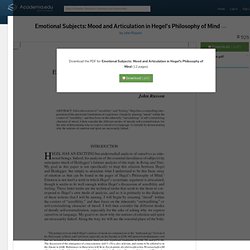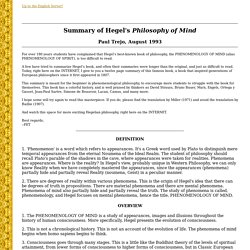

The development of modern logic. Hegel, Literature, and the Problem of Agency. Introduction to the Reading of Hegel by Alexandre Kojeve. Emotional Subjects: Mood and Articulation in Hegel's Philosophy of Mind (John Russon) 44 john russon dd b b .

I , H Empf , “bjvz” “b.” Nv, k w d, w “m” b, b, m v “bjvz” mm , b d d , m b d d w . Sb, , w bj, d m, d . Tb kd --mm , b -w (, v, bj-v, v) v , v dm.
I b wk—b wk —w ’ dm.Md b, b-wk-w- ’-dm. Md v w -d d . Zz §399, . 96 / 72. T “ f,” stmm Book II of Hegel's Science of Logic - Essence. Reflection - Appearance - Actuality The truth of being is essence. ® Being is the immediate. Since knowing has for its goal knowledge of the true, knowledge of what being is in and for itself, it does not stop at the immediate and its determinations, but penetrates it on the supposition that at the back of this being there is something else, something other than being itself, that this background constitutes the truth of being. When this movement is pictured as the path of knowing, then this beginning with being, and the development that sublates it, reaching essence as a mediated result, appears to be an activity of knowing external to being, and irrelevant to being's own nature.
But this path is the movement of being itself. If, therefore, the absolute was at first defined as being, now it is defined as essence. But essence as it has here come to be, is what it is, through a negativity which is not alien to it but is its very own, the infinite movement of being. I. 1. 2. Hegel.puns.pdf (application/pdf Object) PhG bibliography - Bibliography. A Companion to Epistemology. The Bernstein Tapes. System of Science-hegel.net. Summary of Hegel's Philosophy of Mind. Up to the English Server!

Paul Trejo, August 1993 For over 180 years students have complained that Hegel's best-known book of philosophy, the PHENOMENOLOGY OF MIND (alias PHENOMENOLOGY OF SPIRIT), is too difficult to read. A few have tried to summarize Hegel's book, and often their summaries were longer than the original, and just as difficult to read. Today, right here on the INTERNET, I give to you a twelve page summary of this famous book, a book that inspired generations of European philosophers since it first appeared in 1807.
This summary is meant for the beginner in phenomenological philosophy, to encourage more students to struggle with the book for themselves. This book has a colorful history, and is well praised by thinkers as David Strauss, Bruno Bauer, Marx, Engels, Ortega y Gasset, Jean-Paul Sartre, Simone de Beauvoir, Lacan, Camus, and many more.